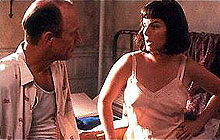|
|
|
|
Pollock
|
 |
|
This film took me completely by surprise. I expected a well-acted but perhaps only adequately directed movie in homage to a great American artist, in the vein of Julian Schnabel's Basquiat (1996). Ed Harris, both star and director, himself speaks modestly of his work, emphasising the intrinsic interest of Jackson Pollock as a historic character. But even if Harris returns solely to acting and never directs another film, like Charles Laughton with The Night of the Hunter (1955) or Marlon Brando with One-Eyed Jacks (1961), his place in cinema history is now assured. Pollock is an extraordinary movie, intensely focused and finely honed at every moment. It is also one of the most emotionally powerful films of the year. There is only one American movie of the preceding decade to which Pollock invites close comparison, and that is Ulu Grosbard's grossly underrated Georgia (1995). Both films are written by Barbara Turner, here collaborating with Susan Emshwiller. Turner is, I suspect, as much the auteur of Pollock as Harris. All the deep, psychological themes she treated in that earlier script, such as the binds of mutual dependence and the trauma of knowing whether or not one is artistically talented, recur here. But Pollock is even more screwed up than Jennifer Jason-Leigh's character in Georgia. The film picks up his life-story just as he is establishing his own style as a painter. He meets Lee Krasner (Marcia Gay Harden), who is both blessed and cursed by her love for him. It would have been easy for the film to portray Krasner as one or another stereotype – an exploitative opportunist, a cold intellectual, an unfairly overlooked woman painter – but she emerges in all her rich, passionate complexity. Pollock himself is a much less conventionally readable character. Depressive, withdrawn, often inarticulate, he seems to find even the simplest human interaction an ordeal. Harris, in an astonishing performance, captures every shade of this dark, inscrutable personality. The trauma that certain situations cause him, such as a radio interview, or especially the act of being filmed 'on the job' by Hans Namuth (Norbert Weisser), is rendered with agonising truthfulness. One of the most remarkable threads of the film is devoted to the uneasy relationship between Pollock and his champion, Clement Greenberg (Jeffrey Tambor). Never have I seen on screen the fraught tie between an artist and a critic observed and depicted so well. Sometimes we sense that Pollock despises Greenberg's intellectual arrogance and his sadistic power to decree who is in and out in the art world. But at other moments we realise how pathetically dependent the artist is on this sort of acclaim, both for his livelihood and his ego. The screenplay has been closely distilled from the biography Jackson Pollock: An American Saga by Steven Naifeh and Gregory White Smith. Harris avoids virtually every pitfall of the great-artist-biopic form. He concentrates the succession of events of Pollock's life into a chamber drama that is reminiscent of the best work of Ingmar Bergman or Philippe Garrel. The pivotal moment of the film, when the much younger Ruth Metzger (Jennifer Connolly) enters Pollock's life at an art opening and Krasner is instantly eclipsed, carries an indelible force. By contrast, Pollock's death in a car crash is a deliberately understated, matter-of-fact inevitability. If there is one serious criticism to be made of Pollock, it is its total erasure of the artist's involvement with leftist political movements in his earlier years – and, indeed, the entire Cold War context in which Pollock could figure as the 'redemption' of American art in its renewed attempt to assert global supremacy and shut out the influence of other cultures. No one could ever guess from this movie that Pollock once described himself provocatively as "a rotten rebel from Russia". But that is clearly not the story which Harris and his collaborators wished to tell. Pollock concentrates on the finest of details – the way the artist hunched and dripped paint onto a canvas, the phases of his explosive tantrums, the rage of art dealer Peggy Guggenheim (Amy Madigan) at having to walk up stairs like an ordinary person – and builds from these a remarkably lucid and moving portrayal of lives touched by the powers and problems of art. MORE artist biopics: Frida, Passion MORE Turner: The Company © Adrian Martin October 2002 |
![]()